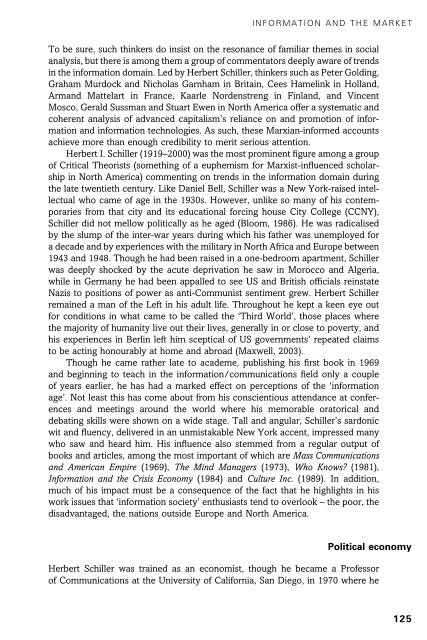Theories of the Information Society, Third Edition - Cryptome
Theories of the Information Society, Third Edition - Cryptome
Theories of the Information Society, Third Edition - Cryptome
Create successful ePaper yourself
Turn your PDF publications into a flip-book with our unique Google optimized e-Paper software.
INFORMATION AND THE MARKET<br />
1<br />
1<br />
1<br />
2<br />
1<br />
To be sure, such thinkers do insist on <strong>the</strong> resonance <strong>of</strong> familiar <strong>the</strong>mes in social<br />
analysis, but <strong>the</strong>re is among <strong>the</strong>m a group <strong>of</strong> commentators deeply aware <strong>of</strong> trends<br />
in <strong>the</strong> information domain. Led by Herbert Schiller, thinkers such as Peter Golding,<br />
Graham Murdock and Nicholas Garnham in Britain, Cees Hamelink in Holland,<br />
Armand Mattelart in France, Kaarle Nordenstreng in Finland, and Vincent<br />
Mosco, Gerald Sussman and Stuart Ewen in North America <strong>of</strong>fer a systematic and<br />
coherent analysis <strong>of</strong> advanced capitalism’s reliance on and promotion <strong>of</strong> information<br />
and information technologies. As such, <strong>the</strong>se Marxian-informed accounts<br />
achieve more than enough credibility to merit serious attention.<br />
Herbert I. Schiller (1919–2000) was <strong>the</strong> most prominent figure among a group<br />
<strong>of</strong> Critical Theorists (something <strong>of</strong> a euphemism for Marxist-influenced scholarship<br />
in North America) commenting on trends in <strong>the</strong> information domain during<br />
<strong>the</strong> late twentieth century. Like Daniel Bell, Schiller was a New York-raised intellectual<br />
who came <strong>of</strong> age in <strong>the</strong> 1930s. However, unlike so many <strong>of</strong> his contemporaries<br />
from that city and its educational forcing house City College (CCNY),<br />
Schiller did not mellow politically as he aged (Bloom, 1986). He was radicalised<br />
by <strong>the</strong> slump <strong>of</strong> <strong>the</strong> inter-war years during which his fa<strong>the</strong>r was unemployed for<br />
a decade and by experiences with <strong>the</strong> military in North Africa and Europe between<br />
1943 and 1948. Though he had been raised in a one-bedroom apartment, Schiller<br />
was deeply shocked by <strong>the</strong> acute deprivation he saw in Morocco and Algeria,<br />
while in Germany he had been appalled to see US and British <strong>of</strong>ficials reinstate<br />
Nazis to positions <strong>of</strong> power as anti-Communist sentiment grew. Herbert Schiller<br />
remained a man <strong>of</strong> <strong>the</strong> Left in his adult life. Throughout he kept a keen eye out<br />
for conditions in what came to be called <strong>the</strong> ‘<strong>Third</strong> World’, those places where<br />
<strong>the</strong> majority <strong>of</strong> humanity live out <strong>the</strong>ir lives, generally in or close to poverty, and<br />
his experiences in Berlin left him sceptical <strong>of</strong> US governments’ repeated claims<br />
to be acting honourably at home and abroad (Maxwell, 2003).<br />
Though he came ra<strong>the</strong>r late to academe, publishing his first book in 1969<br />
and beginning to teach in <strong>the</strong> information/communications field only a couple<br />
<strong>of</strong> years earlier, he has had a marked effect on perceptions <strong>of</strong> <strong>the</strong> ‘information<br />
age’. Not least this has come about from his conscientious attendance at conferences<br />
and meetings around <strong>the</strong> world where his memorable oratorical and<br />
debating skills were shown on a wide stage. Tall and angular, Schiller’s sardonic<br />
wit and fluency, delivered in an unmistakable New York accent, impressed many<br />
who saw and heard him. His influence also stemmed from a regular output <strong>of</strong><br />
books and articles, among <strong>the</strong> most important <strong>of</strong> which are Mass Communications<br />
and American Empire (1969), The Mind Managers (1973), Who Knows? (1981),<br />
<strong>Information</strong> and <strong>the</strong> Crisis Economy (1984) and Culture Inc. (1989). In addition,<br />
much <strong>of</strong> his impact must be a consequence <strong>of</strong> <strong>the</strong> fact that he highlights in his<br />
work issues that ‘information society’ enthusiasts tend to overlook – <strong>the</strong> poor, <strong>the</strong><br />
disadvantaged, <strong>the</strong> nations outside Europe and North America.<br />
Political economy<br />
1<br />
Herbert Schiller was trained as an economist, though he became a Pr<strong>of</strong>essor<br />
<strong>of</strong> Communications at <strong>the</strong> University <strong>of</strong> California, San Diego, in 1970 where he<br />
125
















